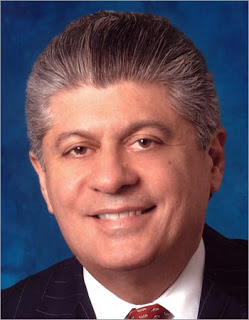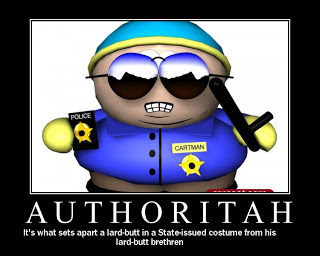Pistol-Packing Positivists: Our Enemy in Blue
 How would you react if you were waylaid by an armed and bellicose stranger who has the means to kill you and your family and the power to get away with the crime?
How would you react if you were waylaid by an armed and bellicose stranger who has the means to kill you and your family and the power to get away with the crime?
Very few of us would react with the self-possession displayed by 28-year-old Jared Massey when his SUV was stopped by John Gardner of the Utah Highway Patrol (UHP) last September 14.
Whether or not Massey was speeding through a construction zone, he was entirely within his rights to demand clarification of his supposed offense before affixing his signature to the traffic ticket. There was no need for Massey’s signature.
Had Gardner been interested in enforcing the law rather than asserting his authoritah,* he would simply have scrawled “refuses to sign” on the citation in his no-doubt puerile and illegible hand (as a tax feeder of the thug caste, Gardner is marginally literate at best), handed it to the motorist, and gone about his merry way in pursuit of fresh victims.
But Gardner, most likely motivated by the resentments common to steers that wish they were bulls, just had to order Massey out of the car and place him under arrest – for doing nothing that constitutes a crime.
It is not a crime for a citizen to demand that a police officer justify a traffic stop. Massey, who admitted to driving 68 mph in what he apparently thought was a 65 mph zone, was reasonably cooperative and genuinely puzzled by Gardner’s claim that the driver had missed a sign posting a 40 mph construction zone.
Gardner assumed a hostile posture when Massey made his further cooperation contingent on being shown that he had violated the speed limit. Which is to say that Gardner immediately sized up the motorist as an enemy combatant (no other term is adequate) because Massey refused to behave as a cringing, docile serf.
It is not a crime for a motorist to withhold his signature from a traffic ticket, since the signature is unnecessary (refusing to sign means that you won’t be charged with a misdemeanor if you don’t show up in court). A UHP spokesman has conceded that Gardner’s best option was to put the citation in the vehicle “in a professional manner and leave it at that.”
And once again, Massey was making an entirely reasonable request: He wanted to be shown the speed limit sign he had supposedly ignored.
At this point, Gardner needlessly escalated the encounter to one of unalloyed violence, ordering Massey from the car and attempting to place him under arrest. Although the regulations of his professional tribe permit this, Gardner had no right or reason to do this, since the ticket had been written and the matter should have been turned over to a court.
But Gardner, like nearly everybody else in his line of work, believes that his job is not to protect the public, but to make it submit to the supposed authority of the State. Which is why, when Massey quite reasonably decided he was no longer going to play the role in which Gardner had cast him, the UHP officer committed the crime of assault with a deadly weapon by shooting Massey with his Taser.
This was done while Massey was walking away from Gardner. His behavior was non-cooperative, but also non-threatening. The UHP’s policy governing the use of a Taser does not permit an officer to use it against someone who is merely non-cooperative; the subject must pose some kind of threat to himself, the officer, or innocent bystanders in order for a Taser attack to be justified.
The problem here is that Gardner, a 14-year veteran of the UHP, was about to lose bladder control (an affliction common to geldings), so frightened had he become by Massey’s non-threatening behavior.
As the hero explained to a colleague a few minutes later, Massey was “making me nervous as hell” by his insistence on being treated as a reasonable adult, rather than behaving like a timid child. “I was like, nah, we ain’t playing this game,” Gardner boasted to the second officer by way of justifying the Taser strike.
“Good,” gloated the second tax-fed parasite. “Good for you.”
Bear in mind here that it was Gardner who was playing a “game” by needlessly escalating an unpleasant situation. If he had been genuinely concerned about his personal safety, why did he order Massey from the car, rather than simply handing him the citation and walking away, when there was no reason for an arrest? Why commit an armed assault on a husband and father in front of his family, and then threatening the wife with arrest for objecting to her husband’s treatment?
This was undisguised, needless aggression fueled by an adolescent need on Gardner’s part to assert dominance over someone who wasn’t part of his club. Which is why his behavior received the immediate and unqualified approval of another member of that gang.
We are incessantly hectored about the supposedly indispensable role played by police in protecting us from the anarchic violence that would prevail in their absence. Yet every single day – thanks, in no small measure, to the advent of on-line video – we see how police themselves have become the most dangerous predators we face.
Through his literary creation Screwtape, C.S. Lewis once warned (I paraphrase) that one of the Devil’s most effective tricks is to rivet the public mind on the danger posed by a vice that is the exact opposite of the one currently in vogue. For example, where gluttony is ubiquitous, the Devil tempts people to condemn the vanity of those who strive to remain thin.
In like manner, we are always and ever admonished about the evils of anarchy at a time when the State and its agents are, with ever-increasing brazenness, imposing unalloyed tyranny on our society. We are treated to pious homilies about the need for citizens to respect the law when those exercising government power are becoming entirely emancipated from any restraints on their discretionary use of lethal violence. We are instructed to ruminate on the manifold hypothetical outrages that could be committed in the name of anarchy, even as the very tangible atrocities committed by State agents accumulate.
In his valuable new book A Nation of Sheep, retired federal Judge Andrew Napolitano describes how our society – both the Regime ruling us and far too many of the ruled – has succumbed to positivism, a legal perspective in which “the law is whatever those in power say it is…. Under positivism, whoever or whatever controls the government, whether a majority or a minority, always rules and always gets its way.”

During the 14 years he has been a State Trooper – meaning that he has been cared for at the expense of better people who make an honest living – John Gardner has been deeply marinated in positivism. While he’s clearly too dim to expatiate the theoretical concepts, Gardner’s behavior indicates that he has an instinctive understanding of positivism in practice. As someone clad in a State-issued costume, given a gun and a Taser and expansive discretion in using those implements of violence, Gardner clearly behaves he doesn’t have to play any “games” with those who aren’t part of his tribe.
“What the hell is wrong with you?” exclaimed Massey as Gardner, his face contorted with primal rage, threatened him with a Taser.
That’s a useful question. A better one is this: What the hell is wrong with the rest of us, that we are willing to live under a system of the sort that rules us?
_____
*authoritah (n.) — The conceit that people clad in ridiculous State-issued costumes are owed some kind of reflexive deference by the decent, law-abiding citizenry upon whom such tax-feeders inflict themselves.
Dum spiro, pugno!
Content retrieved from: http://freedominourtime.blogspot.com/2007/11/pistol-packing-positivists-our-enemy-in.html.




























